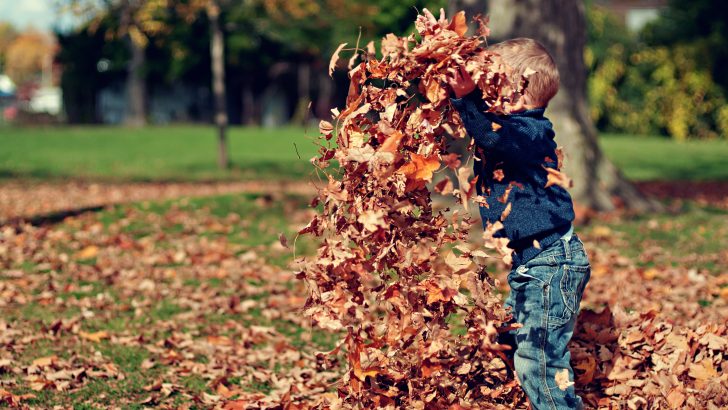It is the finest sort of autumn morning. The sun shines kindly upon the apple trees, their boughs now heavy with fruit. Clusters of ripe apples gleam red against pale blue skies. The leaves of the beech and sycamore are already turning a golden brown. Yet the ash trees stand defiantly green, in a willful pretence that summer is still amongst us. Yet their deception is laid bare by morning chill, which tells us that autumn is deepening, and darkening, every day. The sun’s increasingly feeble warmth dissipates rapidly with the onset of each day’s ever-earlier dusk.
Since the summer, the children have been excitedly assisting me in hauling logs from our overgrown woods. We have been busy cutting, splitting and storing them in the woodshed. The older kids have been heaving their wobbly wheelbarrows of logs towards the shed, suffering the occasional capsize, while the smaller ones push toy prams along proudly, with a few logs in each, where the doll should be. All take great pride and satisfaction in their work. It doubles the pleasure they feel from the warmth of the stove to know that their own work contributed to it.
We recently replaced our old oil-fired range with a solid fuel one, with the aim of heating our old farmhouse largely with wood. Doing so is largely carbon neutral, since we re-grow the trees, and such fuel is also free, since it comes from our own woods. Indeed, much of our wood still comes from the many large trees felled brutally for us by hurricane Ophelia two years ago.
There is an old adage that a tree heats you three times: once when you plant it, once when you chop it down, and once when you burn it. Certainly the splitting and hauling of logs is warm work. It is good too to see the tangled woods breathe easier again, as gnarled masses of fallen branches are slowly removed.
On our excursions to the woods, blackberries are often discovered, providing a welcome snack. The kids have also delighted in making jam this autumn. They take great joy in finding something in nature and, through their own work, making something useful of it for their family. Pots of homemade jam have been proudly presented to grandparents and friends.
They find pleasure in engaging with nature directly, and bringing forth its bounty with their labour. This is how all our ancestors lived, after all, and perhaps this is why we feel so at home when carrying out these minor acts of self-sufficiency, which almost seem as acts of defiance in our era of high technology and cheap manufactured food and goods. In a society where much of the work is done behind screens, by robots, or in factories – and produce arrives pre-packaged – a gulf is opening for many which separates them from the natural world. There is an increasingly rare joy in taking stock of the world as it truly is. For an increasingly few people, the approach of real storms is what matters, and not the digital hysteria of twitterstorms.
For fine October mornings are the rarer ones. As I write, the approach of hurricane Lorenzo is in the headlines. We are in the orange warning zone, with winds of 130km/h forecast. It’s all part of the lottery of weather which the North Atlantic throws at us. The kids are excited at the prospect of a storm, since all the other kids in school are saying they might get a day off. For us adults, the approach of an unpredictable storm reminds us of other realities which our era would rather forget: That we are small creatures, standing at the edge of a vast ocean, upon whose mercy we must rely.


 Rory Fitzgerald
Rory Fitzgerald
